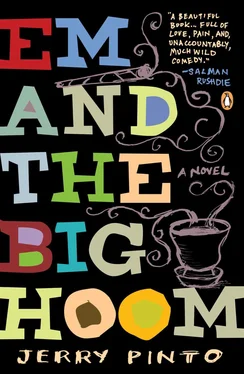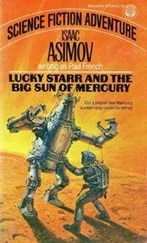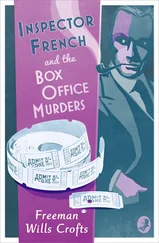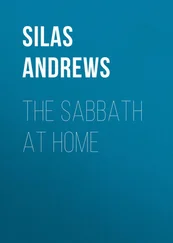Jerry Pinto - Em and the Big Hoom
Здесь есть возможность читать онлайн «Jerry Pinto - Em and the Big Hoom» весь текст электронной книги совершенно бесплатно (целиком полную версию без сокращений). В некоторых случаях можно слушать аудио, скачать через торрент в формате fb2 и присутствует краткое содержание. Год выпуска: 2014, Издательство: Penguin Books, Жанр: Современная проза, на английском языке. Описание произведения, (предисловие) а так же отзывы посетителей доступны на портале библиотеки ЛибКат.
- Название:Em and the Big Hoom
- Автор:
- Издательство:Penguin Books
- Жанр:
- Год:2014
- ISBN:нет данных
- Рейтинг книги:3 / 5. Голосов: 1
-
Избранное:Добавить в избранное
- Отзывы:
-
Ваша оценка:
- 60
- 1
- 2
- 3
- 4
- 5
Em and the Big Hoom: краткое содержание, описание и аннотация
Предлагаем к чтению аннотацию, описание, краткое содержание или предисловие (зависит от того, что написал сам автор книги «Em and the Big Hoom»). Если вы не нашли необходимую информацию о книге — напишите в комментариях, мы постараемся отыскать её.
Em and the Big Hoom — читать онлайн бесплатно полную книгу (весь текст) целиком
Ниже представлен текст книги, разбитый по страницам. Система сохранения места последней прочитанной страницы, позволяет с удобством читать онлайн бесплатно книгу «Em and the Big Hoom», без необходимости каждый раз заново искать на чём Вы остановились. Поставьте закладку, и сможете в любой момент перейти на страницу, на которой закончили чтение.
Интервал:
Закладка:
After the funeral, we went home.
Susan went off to take a nap. The Big Hoom continued to behave as he had all day, as if a large part of his personality was dissolving and he was unable to stop it. The wake was an ordinary one. After the initial moments of silence and unease, a ten-minute grace period during which the quietness admitted the presence of death, human nature reasserted itself: conversations began, jokes were exchanged, food was eaten and commented upon, generally unfavourably. The Big Hoom rose, somewhere around an hour into the proceedings, and went into the bedroom. I followed him in. He sat down on the edge of the bed. I helped him off with his coat. He smiled briefly and then lay down.
‘I’m all right,’ he said. ‘Go.’
His voice sounded odd, as if it were coming through something thick and viscous. I left him alone to grieve. Susan moved through people with an assurance that seemed new and somewhat overweening, as if she were preparing for the role of family matriarch already. In her hands, and it seemed as if she had an unending supply of them, trays of sandwiches appeared, and individual cups of tea — no sugar, touch of milk; two sugars and generous milk — found their way to the small islands of teetotallers among the bibulous crowd. Granny was surrounded by dowagers, all of whom looked mildly envious of her state. They didn’t seem to be saying much, just sighing at each other and letting clichés drop into the silence.
‘She’s at peace now, poor dear.’
‘Who can understand God’s will?’
‘Whatever it is, she had a heart of gold.’
Cigarette smoke began to cloud the room. And slowly death, the notion of death, departed. The sounds began to take the shape of a party.
For a moment, I felt a huge panic, a suffocating hatred for my own kind, a need to remind all those present that they too would die. In other words, I felt like making a scene or running away or both. Of course, I stayed on and said nothing. I dipped my head and let various women leave traces of talcum powder, liquid foundation and lipstick on my cheek. I shook hands and hugged a series of men, each leaving behind a signature odour. When it became clear that the last of the whiskey had been served and no more was forthcoming, the wake began to fall asleep.
Then the last straggler departed and we were alone. Home was already a thinner, lighter space. There had been days when I had felt suffocated by the life we lived in that flat. I had imagined then that the time would come when I would be the sole owner of these four hundred and twenty square feet of real estate. I remember planning how it would happen. First Susan would get married. Then The Big Hoom would die. And an ugly thrill would run through me at the thought. It was composed of real fear at the thought of his death, of horror at myself at imagining such things, of amazement at the sheer perversity of realizing that this was the only way I would get what I wanted. Then it would be down to me and Em. She would be a problem, but I would manage it so well that everyone — a mythic multi-tongued million-eyed all-knowing Everyone — would praise my handling of my responsibilities while tut-tutting at my reputation as a ladies’ man but admitting tight-lipped that I was a genius at my profession, whatever that should be.
And then Em too would die and I would be alone and the whole world would be different. I had no idea how, but it would be, because I would finally have space to myself and then I could exercise the choice to do as I pleased and when I pleased instead of waiting for a stolen moment in the busy life of this 1BHK.
And now the world expanded as people left the flat. As we opened the door together, I discovered that departures make the world smaller, slighter, less significant. For a moment, my father and I and Susan looked at each other.
Survivors, I thought. Shipwreck survivors.
‘Tea?’ I asked.
He nodded wordlessly and I followed Susan into the kitchen. She set out four cups. I put one away. She began to weep silently. She had always wept silently. And she had always wanted to be alone to weep, so I left the kitchen.
When I returned to the hall, The Big Hoom was sitting in the single armchair and crying too.
My first thought was, ‘Oh God.’ My second thought was, ‘Susan should deal with this.’ But neither God nor Susan would. I was on the spot and it was my call. So I knelt by his side and tried awkwardly to hug him. He tried to stop crying and failed. We stayed like that, with odd thoughts running through my head. ‘She was my mother too, damn it’ and ‘This would be easier on a sofa’ and ‘Where is that tea?’.
Finally, the tea was ready and it lay there in front of us. I tried to remember if I liked tea or not. I just drank it. It was something we did. It was something Em did.
The Big Hoom looked at his cup and said, ‘I think we need something stronger.’
I was not trying to be funny but since we had never kept alcohol in the house, I asked, ‘Coffee?’
‘No,’ he said. ‘I want a drink. Go and get us a bottle of Old Monk.’
He began to dig in his pockets for money as if he had forgotten I was now earning money of my own and could buy us a bottle. But something told me to wait and finally he found the small, neat wad of notes and papers secured by a rubber band that served as his wallet. From it, he drew out a couple of notes. He looked at them slightly puzzled. ‘Will this be enough, do you think?’ he asked.
I grinned at him.
‘I think,’ I said.
The city continued on its way. Boys tried to sell me drumsticks, girls played hopscotch, the Bihari badli worker carried his gathri of ironed clothes to the homes from which they had come, and the buses honked at suicidal cyclists. At one level this was vaguely confusing. Surely, something should acknowledge how much things had changed? At another level, it was oddly comforting.
When I got back, The Big Hoom was boiling peanuts in brine.
‘To go with the rum,’ he said. Susan was looking slightly suspicious.
I ordered a garlic chicken dry from the Chinese thela down the road and found it had gone all swanky. The dish came wrapped in foil instead of the usual thin plastic packet. When I held out the money, the boy looked abashed.
‘Uncle ko bolo, free.’
Then he dashed off. This was The City, India’s biggest, a huge city, but people heard and responded to what was happening in your life. Sometimes, this much was enough.
Susan was annoyed when I dumped the parcel on the counter.
‘There’s loads of food already.’
That was when I noticed how much food there was: casseroles and covered dishes and hotpots of it. The Big Hoom looked at it too. Then he went and dug out all the white plastic containers that restaurants use for takeaways.
‘What are you doing?’ Susan asked. She liked her white plastic containers.
The Big Hoom said quietly, ‘This is too much food. I’m giving it away.’
And so all three of us settled down to dividing up the spoils: some carbohydrates, some meat, some vegetables into each one. It gave us something to do. Me, carbs. Susan, meat. The Big Hoom, veg. When we were finished, there were about twenty mini-meals packed and ready.
‘I’m going to clean up,’ said Susan. ‘You two go.’
By acting cautiously, we managed to prevent any food scuffles, though there was one moment of Bombay bizarreness when an old woman asked if we had a vegetarian option. The Big Hoom was polite; I was not.
‘Beggars can’t be choosers,’ I said.
‘Did a beggar coin that phrase?’ The Big Hoom asked.
‘Probably not.’
‘Then let’s assume that some choices are left, even to beggars.’
‘It just sounds so bizarre. I haven’t eaten for three days. I’m so hungry. But I won’t eat your dirty non-veg food.’
Читать дальшеИнтервал:
Закладка:
Похожие книги на «Em and the Big Hoom»
Представляем Вашему вниманию похожие книги на «Em and the Big Hoom» списком для выбора. Мы отобрали схожую по названию и смыслу литературу в надежде предоставить читателям больше вариантов отыскать новые, интересные, ещё непрочитанные произведения.
Обсуждение, отзывы о книге «Em and the Big Hoom» и просто собственные мнения читателей. Оставьте ваши комментарии, напишите, что Вы думаете о произведении, его смысле или главных героях. Укажите что конкретно понравилось, а что нет, и почему Вы так считаете.











